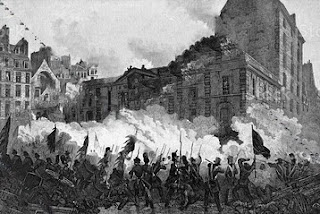-: Critical appreciation of T. S. Eliot The Love Song of J. Alfred Prufrock (1911):-
 |
| Picture from Wikipedia of T. S. Eliot |
With poem such as The Love Song of J. Alfred Prufrock (1911) [subsequently referred to as 'Prufrock'], T. S. Eliot introduces an edgy, disenchanted, utterly contemporary version of French symbolism to the English speaking world. 'Prufrock' is an account of one man's frustrated search to find the meaning of his experience. At the same time, Eliot infuses into it echoes from English Metaphysical Poems, Shakespeare's play, Biblical stories, and adds a philosophical dimension by borrowing ideas from Bergson. The speaker's strong use of imagery contributes to the poem's theme of communion and loneliness, making it an exploration into the tortured psyche of the prototypical modern man— over educated, eloquent, neurotic and emotionally stilled.
If Browning revised the Romantic lyric, Eliot, in turn, revised the dramatic monologue: by blurring the distinction between subject and object and by making it difficult to determine when, where and to whom the persona speaks. In all likelihood, Prufrock's journey is only contemplated and not actually undertaken. Manju Jain says, "the interior monologue and the device of dédoublement [which] are used by Eliot and Laforgue for exploring intensely subjective experience and psychic conflicts", also express here through "you and I". We may see playfulness as the poem's basis throughout.
|-----------------------------------------------------------------------------------------------------------|
|You can also use this answer for these Questions mentioned below:
|1. What is the theme of The Love Song of J Alfred Prufrock?|2. Is The Love Song of J Alfred Prufrock a love poem?
|3. The Love Song of J Alfred Prufrock summery.
|4. What is J Alfred Prufrock afraid of?
|
|-----------------------------------------------------------------------------------------------------------|
The playful and queer sense of humour is noticed even in the title. The name J. Alfred Prufrock, compounds of 'prude' and 'frock', awaken verbal associations of prudence, primeness, prudishness, prurience and dandyism. The title again indicates the distance between the poet and persona— the love song is Prufrock's, not of the author.
In the beginning, the epigraph (suggests its theme) from Dante's Inferno (XXVII, ll. 61-66) actually points out the confinement of his divided self which makes him unable to free from overwhelming fear and inhibitions. At first, the outrageous image of the evening as a patient "etherised upon a table" gives a glim of a simile with the suspended state of Prufrock's consciousness. This leads to a Modern critic comment that 'the image's main function is not to describe, but to shock, and its chief suggestion is that disease and numbness— unconsciousness— dominate all we shall see'. But "restless nights in one-night cheap hotels" brilliantly evokes the modern city through which anonymous persons pass in transition to other places. Prufrock is trying to lure us "insidious" manner towards some revelation but expresses "an overwhelming question" which may be related to his proposal to a lady who in contrast can effortlessly converse of Michelangelo and find the 'formulated phrase' with which to categorize Prufrock. The use of "fog" image in terms of a cat is another example of Eliot's use of the conceit to express Prufrock's mental state. He contemplates action through the movements of the cat and the fog, but the contemplation ends in inertia and somnolence. He also mentions Carpe Dime theme and reference of the Book of Ecclesiastes which accentuate his indecisiveness and procrastination paradoxically serving only to increase tension. Again ideas like "murder and create" grossly mismatch with toast and tea and the refrain of Michelangelo.
Prufrock seems to be addressing a potential lover, with whom he would like to "force the moment to its crisis" by somehow consummating (make complete by having sexual intercourse) their relationship. But Prufrock knows too much of life to "dear" an approach to the woman: in his mind, he hears the comments others make about his inadequacies, and he chides himself for "presuming" emotional interaction could be possible at all. The poem moves from a series of fairly concrete (for Eliot) physical settings— a cityscape ( the famous "patient etherized upon a table" ) and several interiors like women's arms in lamplight, coffee spoons, fireplace— to a series of vague ocean images conveying Prufrock's emotional distance from the world as he comes to recognize his second-rate status: "I am not Prince Hamlet".
The rhyme scheme of this poem is irregular but not random. While sections of the poem may resemble free verse, in reality, Prufrock is a carefully structured amalgamation of poetic forms. One of the prominent formal characteristics of Prufrock is its persona's continual use of refrain:
He currently questions "how should I presume?". Both reference part of an earlier poetic tradition and help Eliot describe the consciousness of a modern, neurotic individual. Prufrock's obsession is aesthetic, but it is also a sign of compulsiveness and isolation. At the end of Prufrock fragmented three-three line stanzas are rhymed as the conclusion of a Petrarchan sonnet, but their pessimistic, anti-romantic content, coupled with the despairing interjection, "I do not think they (the mermaids) would sing to me", creates a contrast that comments bitterly on the bleakness of modernity.





No comments
Thanks for your valuable opinion. Your comment inspires us a lot to do better time and again.